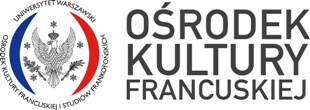Wtorek geopolityczny 18/10/2022 – dr Anaïs Marin

Ośrodek Kultury Francuskiej i Studiów Frankofońskich UW, Wydział Nauk Politycznych i Studiów Międzynarodowych UW oraz Polskie Towarzystwo Studiów Międzynarodowych we współpracy z Groupe d’études géopolitiques zapraszają na spotkanie z cyklu WTORKI GEOPOLITYCZNE.
The role of Belarus in Russia’s aggression against Ukraine
dr Anaïs Marin (OKFiSF UW)
18.10.2022 wtorek
godz. 15.00-16.30
On-line : rejestracja seminarium.okf@uw.edu.pl
Spotkanie w języku angielskim.
Informujemy, że spotkanie jest rejestrowane. Nagranie będzie wykorzystane w celach naukowych. Udział w spotkaniu jest równoznaczny z wyrażeniem zgody.
The role of Belarus in Russia’s aggression against Ukraine
Since 2021 Belarus has moved from situational neutrality to playing an enabling role for Russia’s ongoing aggression against Ukraine – short of engaging its own military in the battle however. Belarus’ territory and infrastructure have been used for the transit and servicing of Russian troops and military equipment, for launching lethal air attacks on civilian targets in Ukraine, and for shipping goods looted by Russian soldiers back into their homeland. Such provision of logistical support not only violates the Constitution of the Republic of Belarus: pursuant of international law, it is enough to qualify the country as a co-aggressor state – a status which motivated the extension of Western sanctions against its leadership over the past months. As in previous years, sanction policies fail to affect A.Lukashenka’s behaviour however.
The role that Belarus has been and might be playing in the conflict raises several practical, theoretical, and moral questions. Isolated internationally since the intensified crackdown on dissent that followed A.Lukashenka’s last contested re-election in August 2020, the Belarusian regime cannot solve its proverbial security entrapment by courting the West anymore. Neither can it build on its strategic partnership with China to try and compensate for Belarus’ structural dependence on Russian subsidies. Yet it now appears to be keen on distancing itself from the Kremlin, especially as the latter is experiencing setbacks on the front, and, increasingly, popular criticism at home too. Whereas A.Lukashenka’s room for manoeuvre has shrunk to almost null, his indefectible support to V. Putin, which amounts to trading off Belarus’ sovereignty, might now also jeopardise his own regime survival.
In highlighting the long-term causes and actual modalities of Belarus’ involvement in Russia’s war on Ukraine, this lecture aims at providing keys for understanding the broader geopolitical implications of this involvement, and suggesting possible scenarios for the region’s future.
Anaïs Marin (PhD, Sciences Po) is a political scientist specialized in IR, Eurasian and border studies. Her research focuses on the external policies of authoritarian regimes (“dictaplomacy”) and Russia’s “sharp power”. Dr Marin also published extensively on Belarusian foreign and domestic policies, Eurasian integration and the EU’s Eastern Partnership. She cooperated with several European think tanks and is currently an associate fellow with the Russia and Eurasia program at Chatham House (London). A Belarus expert, she contributes analyses and policy recommendations for various European governments and institutions. Since 2018 she is also holding the (pro bono) mandate of UN Special Rapporteur on the situation of human rights in Belarus.